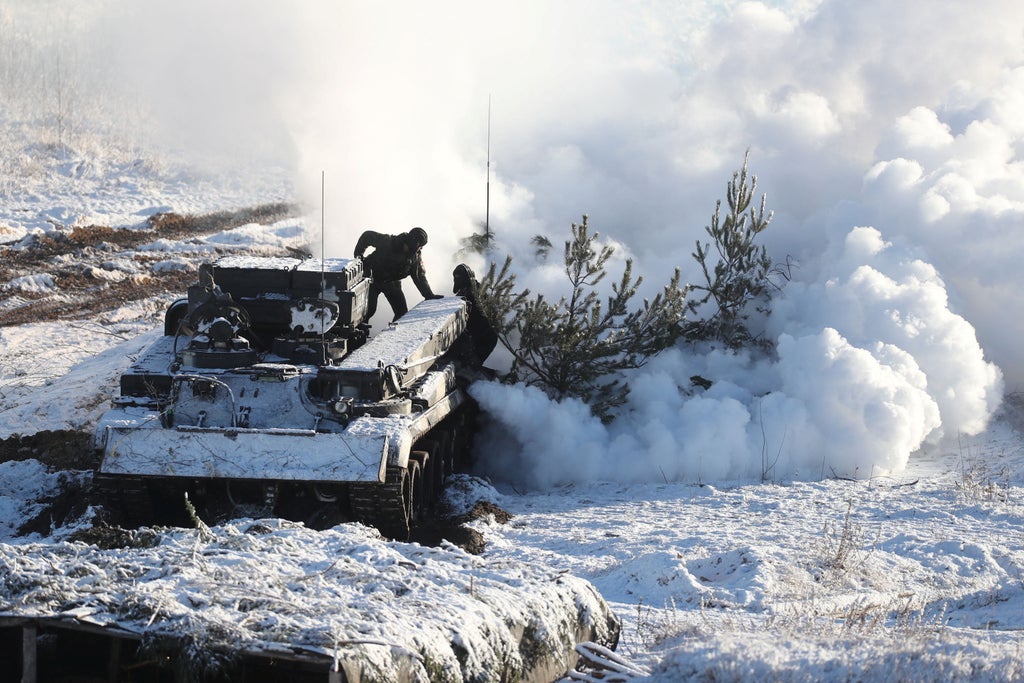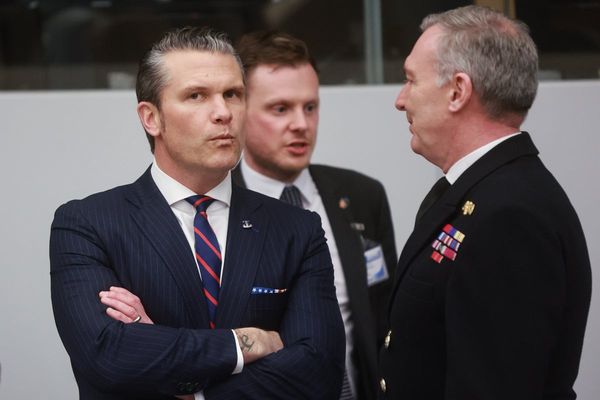
The US warned on Saturday of a “resolute” and “massive” response to any Russian invasion of Ukraine just hours before President Joe Biden was scheduled to speak to Vladimir Putin, in an apparent last-ditch attempt to avoid military conflict in eastern Europe.
US Secretary of State Antony Blinken tweeted that he had spoken to Russia’s foreign minister Sergei Lavrov hours before the presidents were due to speak and made clear Washington’s response to any Russian aggression.
“I spoke with Foreign Minister Lavrov today to urge a diplomatic resolution to Russia’s unprovoked military build-up around Ukraine,” Blinken wrote. “I reiterated that further Russian aggression would be met with a resolute, massive, and united Transatlantic response.”
Blinken and Lavrov’s call came on another day of furious diplomatic action amid increasingly grim predictions that a war in Ukraine was growing increasingly likely.
Mr Putin also spoke to France’s President Emmanuel Macron, just days after they met in Moscow.
The US claimed on Friday a military conflict could begin at any moment and have, like several other countries including the UK, advised its citizens to leave the country. Some in Washington have predicted that fighting could begin by the middle of next week, placing even extra importance on Saturday’s phone call.
Several other countries ordered their citizens to leave Ukraine on Saturday including Australia, New Zealand and Sweden joining other nations such as Britain, Germany and the Netherlands which have done the same.
The UK also said it was withdrawing its troops from Ukraine. Small numbers of British personnel have undertaken Operation Orbital training missions in the eastern European country since Russia’s seizure of Crimea in 2014 , including around 30 deployed recently to train the Ukrainian military on anti-tank missiles
Russia has massed more than 100,000 troops near the Ukraine border and has sent troops to exercises in neighbouring Belarus, but insistently denies that it intends to launch an offensive against Ukraine. In addition to the troops, US officials say Russia has deployed missile, air, naval and special operations forces, as well as supplies to sustain a war.
This week Russia moved six amphibious assault ships into the Black Sea, augmenting its capability to land marines on the coast.
The Ukrainian Foreign Ministry on Saturday called for everyone to “remain calm” and “avoid actions that undermine stability and sow panic”..
It added that its armed forces “are constantly monitoring developments and are ready to rebuff any infringement on the territorial integrity and sovereignty of Ukraine”.

Several thousand Ukrainians rallied in Kiev on Saturday to show unity amid fears of a Russian invasion. They chanted “Glory to Ukraine” and carrying Ukrainian flags and banners that said “Ukrainians will resist” and “invaders must die”.
Ukrainian President Volodymyr Zelenskiy, who attended police drills in southern Kherson region, said a Russian attack could happen at any time, but pushed back against what he called excessive amounts of information about a major looming war.
“The best friend of our enemies is panic in our country. And all this information is just provoking panic and can’t help us,” he said. “I can’t agree or disagree with what hasn’t happened yet. So far, there is no full-scale war in Ukraine.”
Russia though has scoffed at America’s talk of urgency.
“The hysteria of the White House is more indicative than ever,” said Russian spokeswoman Maria Zakharova. “The Anglo-Saxons need a war. At any cost. Provocations, misinformation and threats are a favorite method of solving their own problems.”
Mr Biden and Mr Putin’s call is scheduled for 11 am ET (4pm UK time), and will be the first since last December, reported CNN.
It comes after a hectic week of diplomatic negotiations designed to remove the risk of war.
The French president Emmanuel Macron and British Foreign Secretary Liz Truss were among those to visit Moscow this past week as well as four-way talks taking place in Berlin between Russia, Ukraine, Germany and France but with no breakthrough.
Russia is demanding that the West keep Ukraine and other former Soviet countries out of NATO.
It also wants NATO to refrain from deploying weapons near its border and to roll back alliance forces from Eastern Europe — demands flatly rejected by the West. Russia and Ukraine have been locked in a bitter conflict since 2014, when Ukraine’s Kremlin-friendly leader was driven from office by a popular uprising.
Moscow responded by annexing the Crimean Peninsula and then backing a separatist insurgency in eastern Ukraine, where fighting has killed over 14,000 people.
A 2015 peace deal brokered by France and Germany helped halt large-scale battles, but regular skirmishes have continued, and efforts to reach a political settlement have stalled.
Additional reporting from the wires







